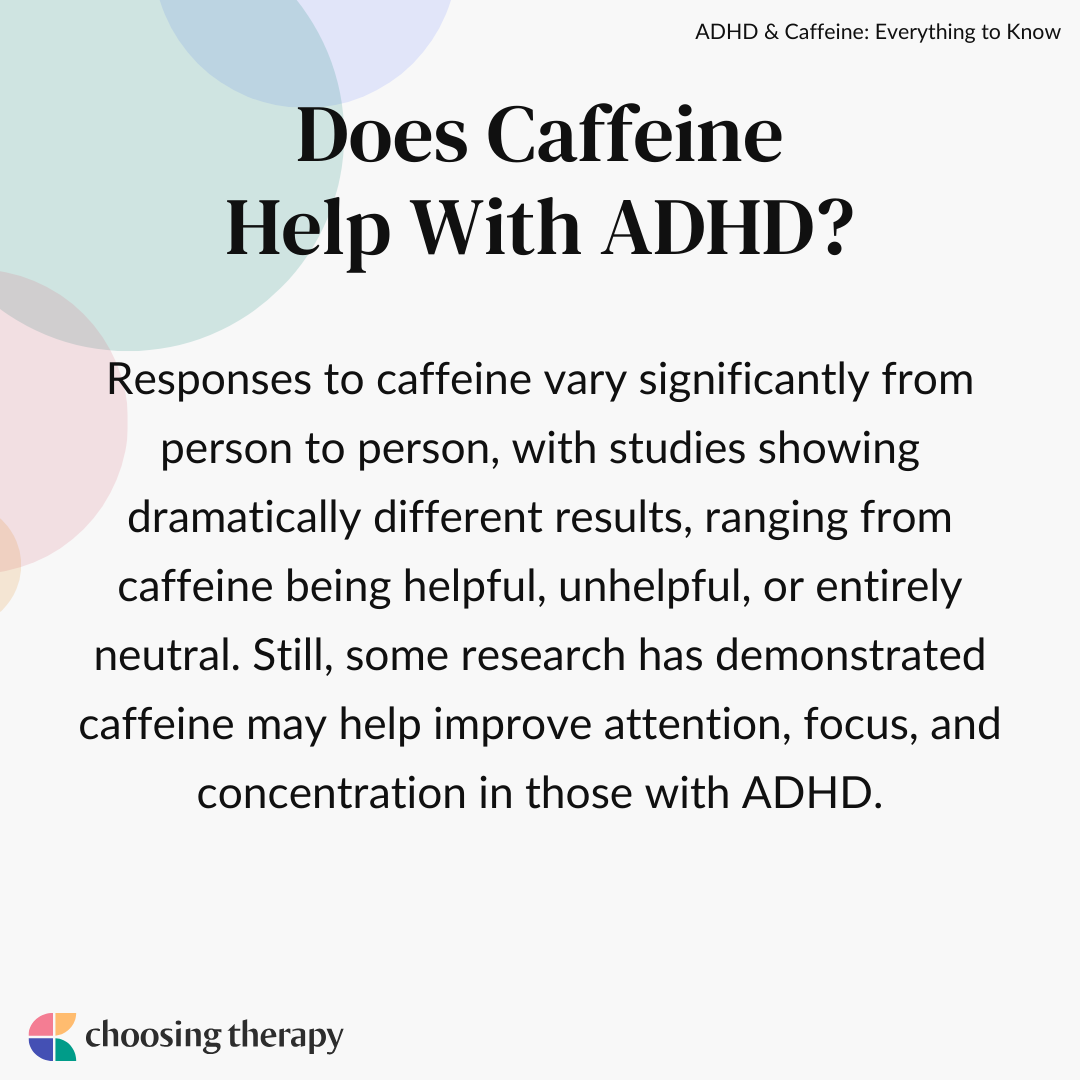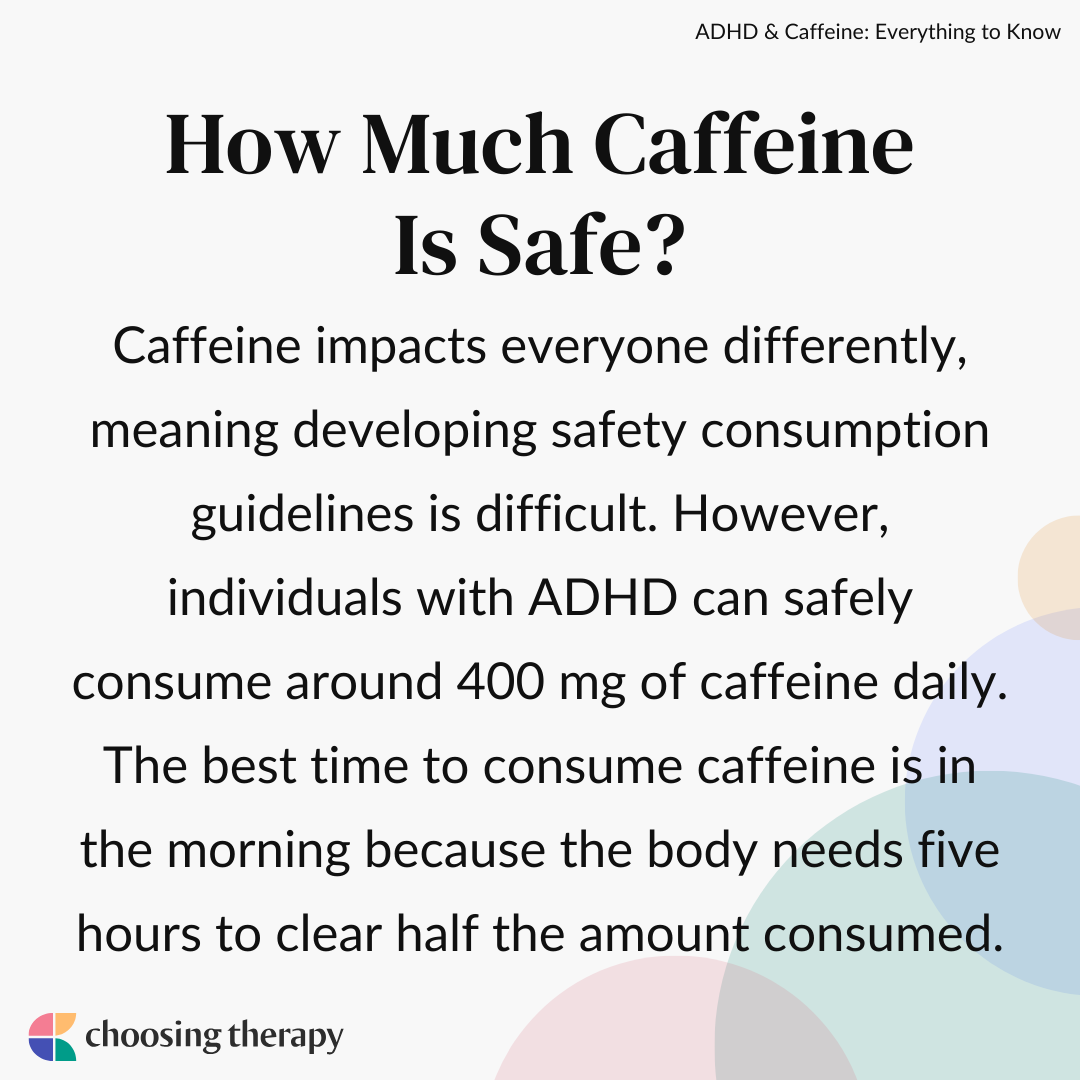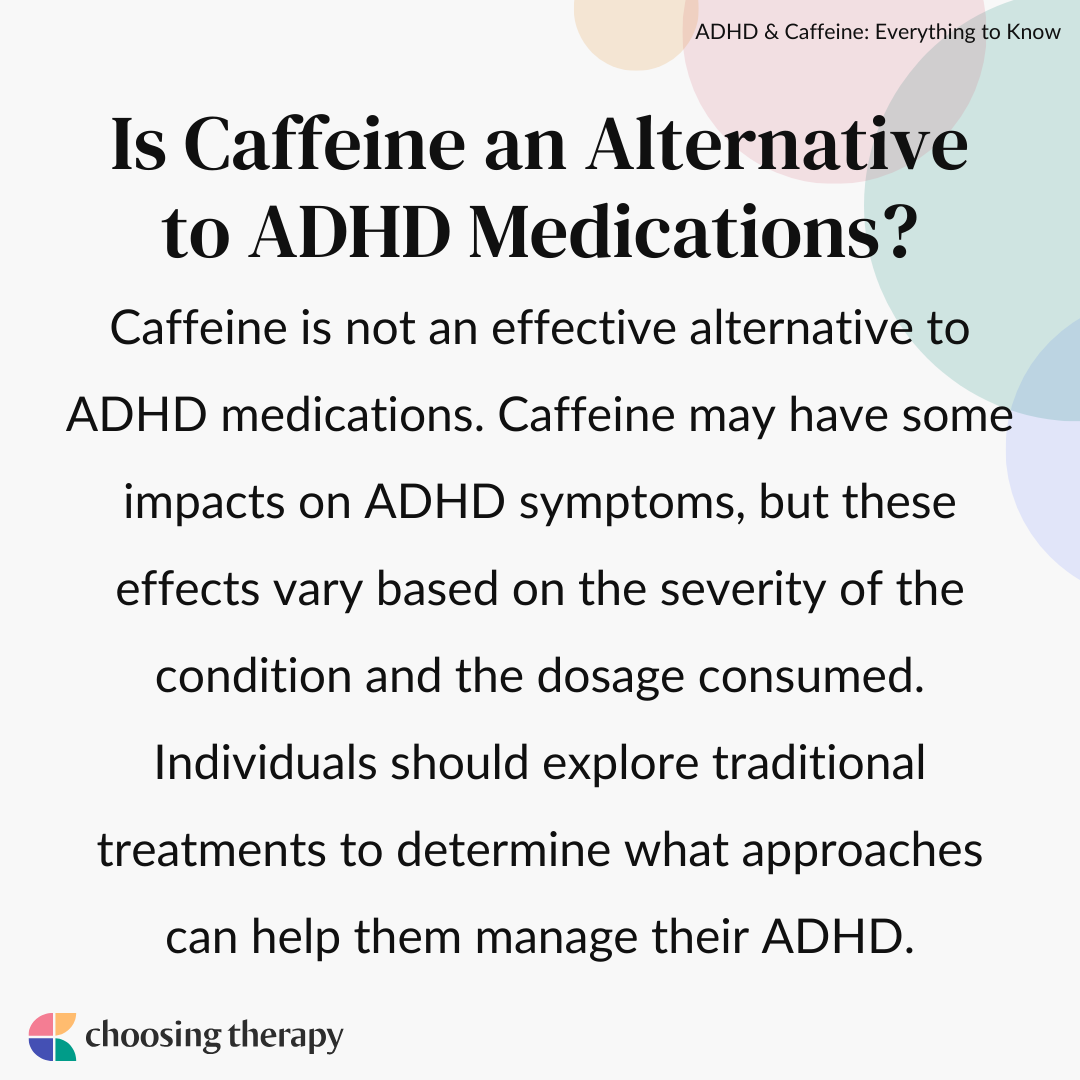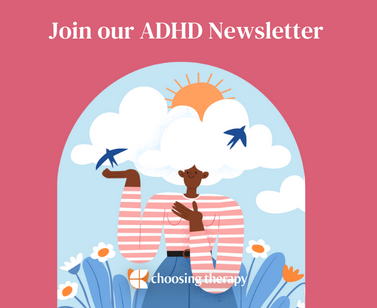
Research on ADHD and caffeine is mixed, with some studies showing positive, negative, and neutral effects on individuals. Some people with ADHD report increased concentration and focus when consuming caffeine, while others may experience reduced sleep or increased anxiety. Caffeine may offer some benefits but does not replace traditional treatment methods.1
Online Psychiatry For ADHD Covered By Insurance
Talkiatry can match you with a real psychiatrist who takes your insurance and is seeing new patients. They’re in-network with major insurers and offer medication management. Get started with a short online assessment
What Is Caffeine?
Caffeine is a central nervous system stimulant that binds to adenosine receptors, increasing the dopamine and norepinephrine in the blood.2 This increase helps individuals feel energized with renewed focus and concentration.
ADHD & Caffeine: What Is the Link?
Low dopamine levels in ADHD are a common occurrence, often contributing to the characteristic symptoms of ADHD like inattention and poor memory. Because caffeine boosts dopamine, some experts suggest this stimulant may indirectly improve concentration, focus, and attentiveness by balancing these deficiencies. However, more research is necessary to support these findings.3
Does Caffeine Help With ADHD?
Many people may wonder, “How does caffeine affect ADHD?” Research regarding the effects of caffeine on ADHD symptoms is inconclusive. Responses to caffeine vary significantly from person to person, with studies showing dramatically different results, ranging from caffeine being helpful, unhelpful, or entirely neutral. Still, some research has demonstrated caffeine may help improve attention, focus, and concentration in those with ADHD.
Possible benefits of caffeine for ADHD include:
1. Improved Attention
People with ADHD struggle with sustained attention, meaning they may be prone to distractibility and poor impulse control. While specific research indicating that caffeine improves attention is limited, some anecdotal data suggests consumption may temporarily boost focus, particularly when studying or completing work assignments.
2. Better Planning Skills
Research shows caffeine can enhance the efficiency of planning and sequencing capabilities when mildly sleep-deprived. However, this research does not specifically focus on people with ADHD. Still, because ADHD and sleep issues often go hand-in-hand, caffeine may be beneficial in the early mornings.4
3. Reduced Memory Impairments
Research suggests a positive relationship between caffeine and long-term memory. However, exact data is inconclusive, and current studies examining how caffeine specifically affects memory for people with ADHD do not exist. That said, many individuals with ADHD report that caffeine helps them retain information better, which may speak to the effects on memory.5
4. Improved Executive Functioning
Research shows caffeine may improve cognitive performance, including executive functions in motor control and attention. These findings reinforce mainstream beliefs that caffeine helps people feel more alert and improves problem-solving. That said, the current research on caffeine has only examined possible effects in children with ADHD.
5. Increased Motivation
Discerning whether caffeine improves motivation is challenging. Instead, assuming that caffeine plays a role in wakefulness, energy, and increased concentration is more plausible. In turn, someone may feel more motivated to complete tasks. Some people with ADHD anecdotally report surges of motivation due to the heightened focus after consuming caffeine.
Get Help For ADHD
Talkiatry can match you with a real psychiatrist who takes your insurance and is seeing new patients. They’re in-network with major insurers and offer medication management. Get started with a short online assessment
Inflow App – Inflow is the #1 science-based app to help you manage your ADHD. Their support system helps you understand your neurodiverse brain, and build lifelong skills. Free Trial
Does Caffeine Make ADHD Worse?
Some people might wonder, “Does caffeine make people with ADHD tired?” In some cases, yes. Caffeine can have the opposite effect on those with the condition, causing them to feel sleepier. Because stimulants like caffeine can disrupt sleep cycles, consumption may also exacerbate current associated problems. Other times, some individuals report caffeine does not affect them whatsoever.
Risks of Consuming Caffeine With ADHD
Individuals with ADHD who consume caffeine in moderation are unlikely to experience adverse effects. However, too much caffeine can lead to irritability, restlessness, and heart palpitations.
Moreover, some studies have found individuals with ADHD are more prone to caffeine addiction and tolerance. Caffeine withdrawal may also be more intense for those with ADHD than neurotypical individuals.6
Below are the possible effects of caffeine on ADHD symptoms:
- Reduced sleep: Caffeine can cause restlessness, exacerbate ADHD sleep problems, and increase irritability. Generally, these side effects are mild until caffeine levels reach 200 mg.3
- Reduced blood flow to the brain: Caffeine can reduce blood flow in the brain, possibly resulting in increased heart rate, insomnia, restlessness, or anxiety.
- Dehydration: Caffeine can cause dehydration, especially in people with ADHD. Research shows caffeine can act as a diuretic, increasing urination and reducing the amount of water stored in the body.
- Increased anxiety: As we know, caffeine is a stimulant that increases alertness and energy. However, too much caffeine can have the opposite effect on individuals with ADHD by heightening anxiety symptoms.
- Stomach issues: Caffeine can produce gastrointestinal problems like diarrhea, nausea, and vomiting in some individuals.
How Much Caffeine Is Safe?
Caffeine impacts everyone differently, meaning developing safety consumption guidelines is difficult. However, individuals with ADHD can safely consume around 400 mg of caffeine daily.3 The best time to consume caffeine is in the morning because the body needs five hours to clear half the amount consumed.
Interactions Between Caffeine & ADHD Medications
In some cases, caffeine may increase the efficacy of ADHD medications and stabilize mood and behavior.7 However, consuming caffeine with Adderall or other stimulants may increase the risk of adverse effects, such as irritability, trouble sleeping, and gastrointestinal issues. Always consult a physician to determine the risks of combining multiple substances.
Is Caffeine an Alternative to ADHD Medications?
Caffeine is not an effective alternative to ADHD medications.7, 8 Caffeine may have some impacts on ADHD symptoms, but these effects vary based on the severity of the condition and the dosage consumed. Individuals should explore traditional treatments to determine what approaches can help them manage their ADHD.
When to Seek Professional Support for ADHD
Consider seeking professional support if you rely on caffeine to help you cope with ADHD. ADHD symptoms in adults can be debilitating, but finding a neurodiversity-affirming therapist can help you achieve success and take back your life. Online therapy platforms are an excellent way to find a provider specializing in ADHD treatment. Online directories can help you locate treatment centers or clinics near you.
In My Experience
Additional Resources
To help our readers take the next step in their mental health journey, Choosing Therapy has partnered with leaders in mental health and wellness. Choosing Therapy is compensated for marketing by the companies included below.
ADHD Management Tools
Inflow App Inflow is the #1 science-based app to help you manage your ADHD. Their support system helps you understand your neurodiverse brain, and build lifelong skills. Free Trial
Online Psychiatry
Circle Medical – ADHD Diagnosis and Treatment. Affordable and accessible ADHD evaluations and treatment, including possible controlled substances medication if clinically appropriate. Diagnosis and prescription over video. Insurance accepted. Same & next day appointments available. Visit Circle Medical
Online Therapy
BetterHelp Get support and guidance from a licensed therapist. BetterHelp has over 20,000 therapists who provide convenient and affordable online therapy. Take A Free Online Assessment and get matched with the right therapist for you. Free Assessment
Free ADHD Newsletter
A free newsletter from Choosing Therapy for those impacted by ADHD. Get helpful tips and the latest information. Sign Up
Choosing Therapy Directory
You can search for therapists by specialty, experience, insurance, or price, and location. Find a therapist today
Do you think you have ADHD? Answer an evidence-based questionnaire for Circles Medical to learn more. Takes 45 seconds.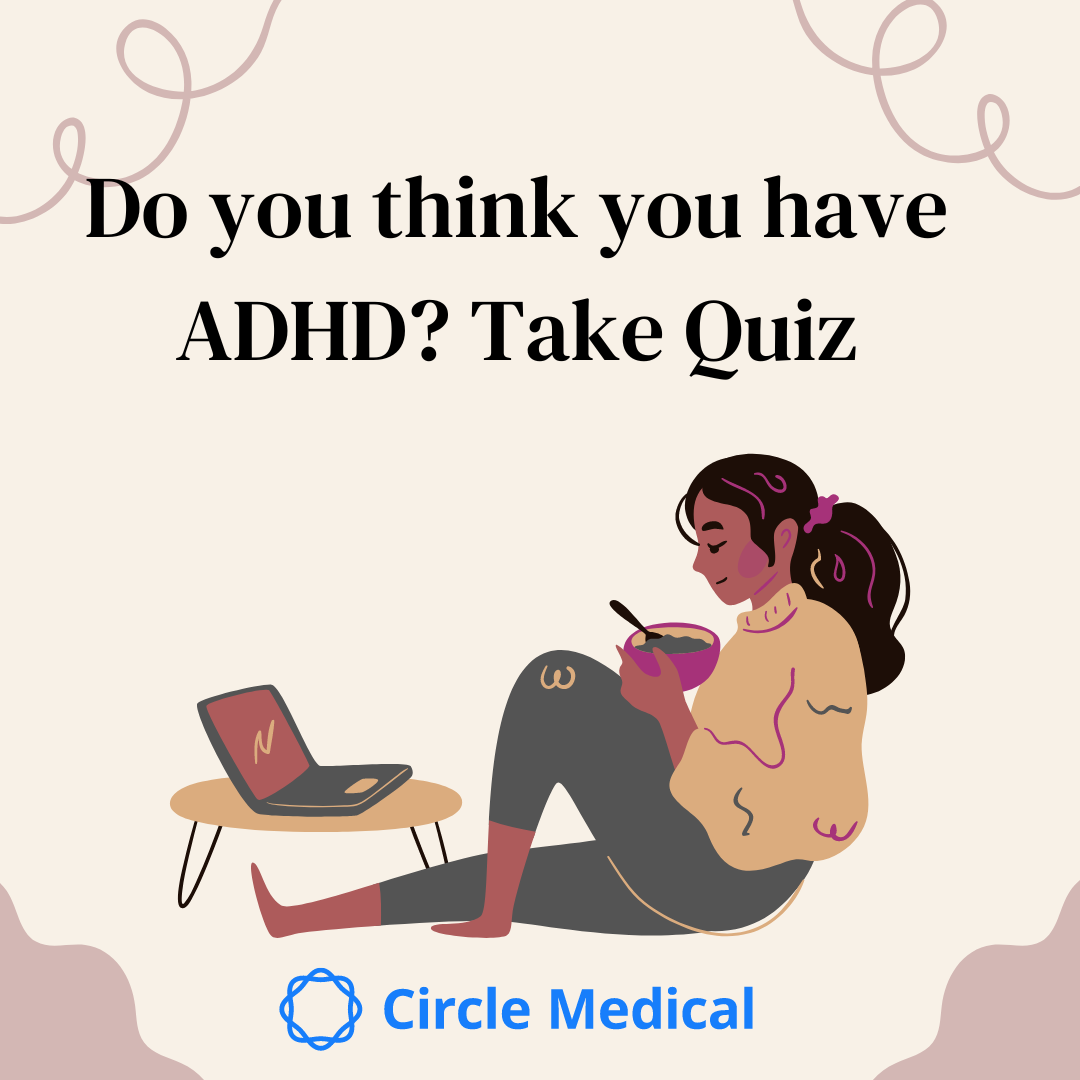
Best Online Psychiatry Services Online psychiatry, sometimes called telepsychiatry, platforms offer medication management by phone, video, or secure messaging for a variety of mental health conditions. In some cases, online psychiatry may be more affordable than seeing an in-person provider. Mental health treatment has expanded to include many online psychiatry and therapy services. With so many choices, it can feel overwhelming to find the one that is right for you.
ADHD & Caffeine Infographics
